SLO woman takes stand in fentanyl murder trial, says she didn’t believe she was a drug dealer
The San Luis Obispo woman charged with murder in the death of a man who overdosed on fentanyl took the stand on Wednesday saying she never considered herself a drug dealer while admitting she lied to police about selling the potent narcotic that killed Quinn Hall.
Hall, 30, was found dead behind the old Animal Services building on Kansas Avenue on Oct. 27, 2022, a day after prosecutors say 50-year-old Brandi Turner sold him the fentanyl that ultimately killed him.
Prosecutors have argued Turner knew the risks of fentanyl before selling it, while her defense maintained she was not at fault because Hall was a regular fentanyl user who was aware of the danger.
The key question, San Luis Obispo County Deputy District Attorney Greg Devitt told the jurors, is not whether Turner sold Hall the fentanyl. The question is what was her state of mind and prior knowledge of the drug before the sale.
Turner is charged with murder, possession of fentanyl for sale, selling fentanyl and possession of meth. San Luis Obispo Superior Court Judge Barry LaBarbera told jurors if they could also consider whether Turner is guilty of involuntary manslaughter only if they found her not guilty of murder.
After Turner took the stand, the case moved to closing arguments on Thursday.
Alleged drug dealer ‘lost everything’ in SLO, she says
It only took a year and a half for drugs to deteriorate Turner’s life, she said as she began her testimony on Wednesday.
She grew up with drug-addicted parents, which drove her to stay away from substances for the majority of her life.
“I’ve always had that mentality that you could choose to emulate your upbringing or you can choose a different path,” Turner said. “I always had pride in myself for not emulating my parents.”
Before working for the California Department of Corrections and Rehabilitation, Turner worked as a mortgage broker until the 2008 financial crisis, before switching to wholesale banking until 2015.
She said she decided to pursue a career in corrections in 2015 because that industry was not as affected by crashes in the economy.
She married her husband in 2008 after dating him for about two years, she testified. She said she didn’t know until later in their marriage that he was addicted to drugs.
She said when she first found methadone in the house, he explained he used to be addicted to the drug but no longer was. But that turned out to be a lie, she said. She later found heroin in the house as well.
Despite her husband’s addiction, Turner said she never tried drugs until she moved to San Luis Obispo.
“I had everything when I moved here,” she told detectives in an interview on Nov. 16. “I made 10 grand a month. I had a brand new paid off fifth-wheel. I had a car. I had a husband. I had a great job.
“Moved to San Luis Obispo, and I lost every f--king thing I had,” she said.
Turner said she came here because she transferred to work at the California Men’s Colony. She was succeeding in her job and had been promoted to a sergeant.
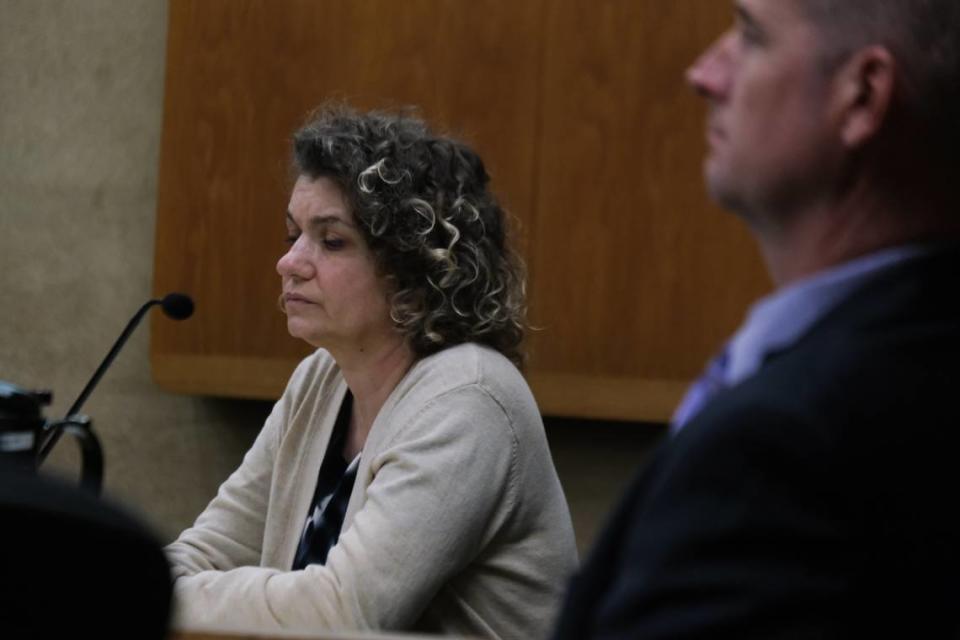
When asked about the training she had received explaining the dangers of fentanyl, Turner said she only “skimmed” the 29-page document. That training took place in the two weeks Turner returned to work after her mental health leave before she terminated her employment.
She had previously owned a home, Turner testified, but when she and her husband moved to San Luis Obispo, they decided to live in her brand-new $15,000 RV.
They first were living in luxury RV parks, but Turner’s husband’s mental health began deteriorating. She said in the Nov. 16 interview that she believed he had paranoid schizophrenia, and on the stand she said she believed he suffered from mental illness because she knew of other members in his family who did as well.
Her husband’s “erratic behavior” eventually would cause them to get kicked out days after they moved into a RV or mobile home park, Turner testified. She said he would scare neighbors by yelling and walking around waving his arms. He also had a large German shepherd and experienced a few a few close calls with the dog biting people.
Then her husband destroyed her RV, she said, taking it apart “piece by piece” looking for bugs or spyware. She had to sell the trailer for $3,500 within a few months of moving to San Luis Obispo, she said.
From there, Turner said, she and her husband lived in her car. She regularly called out of work to take care of her husband and was also dealing with PTSD from prison riots and case files she had read at her previous prison, she said.
Defendant only used fentanyl on accident, she testifies
Some time in 2021, Turner took a mental health leave from work, returned to work for two weeks in March 2021, then had a second leave and never went back.
When her husband came across a trailer for sale for $400, Turner said, the two bought it and moved it to the Oklahoma Safe Parking Site. That trailer, however, was found to be stolen, Turner said, and she was able to get a different trailer donated to her to live in.
By the time Turner had tried drugs for the first time, she said, she had already stopped working for the state prison. She didn’t know anyone in the drug crowd other than her husband until she moved to the safe parking site.
Her mental health from her untreated PTSD and stress of how her life was going in San Luis Obispo pushed Turner to a breaking point, she said.
“There was really no point in staying sober,” she said. “I was ready to kill myself.”
She said she had attempted suicide once before two years prior, but this second time her husband found her and stopped her.
That’s when Turner said she turned to drugs.
Turner said she began using methamphetamine because the high lifted her up. Opiates, she said, made people sick and more zombie-like.
She said she was a daily meth user and had only taken fentanyl on accident three times.
The first time, she said, her husband told her to try drugs out of a pipe without telling her what it was. The second was from a communal pipe she thought was packed with meth, and the third was what she and her husband thought was cocaine.
That third time, her husband died from a fentanyl overdose, and she ended up in the hospital.
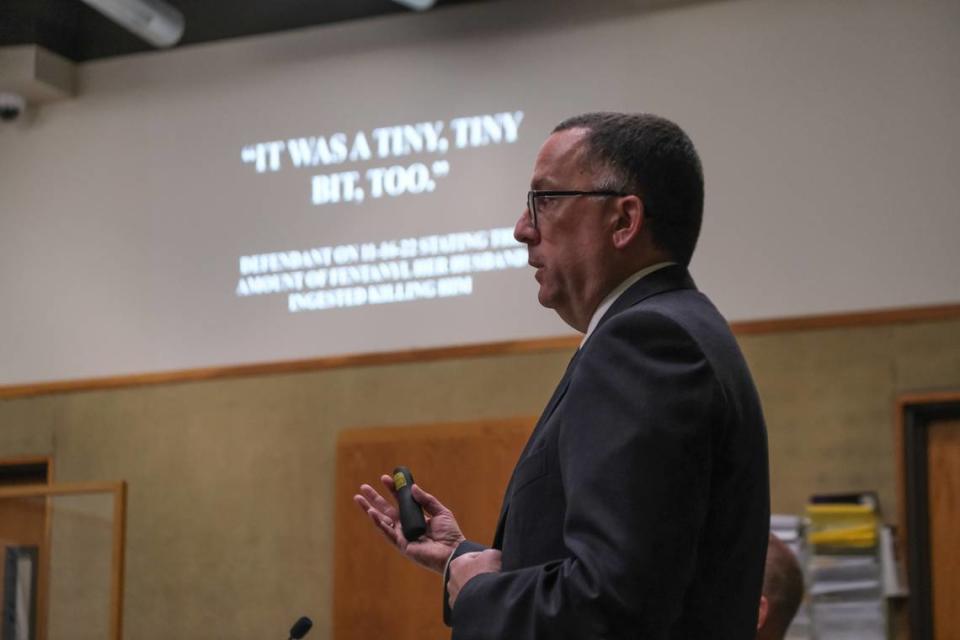
Woman didn’t think she was a drug dealer, she says
Turner testified that she was introduced to Hall because she was looking for testosterone or steroids.
She was hoping to potentially switch from meth to testosterone, she said. Hall sold her a small vial of steroids, she said, and the two became friends. He sometimes made steroids or knew where to buy them on the dark web, she said.
She described her relationship with Hall as more flirtatious than romantic. She and Hall would see each other monthly and smoke meth together.
She said Hall was very knowledgeable about steroids and the differences between each type. The two would talk about steroids, meth, ketamine and sometimes GHB.
“He was extremely intelligent and smart in science,” she said.
Turner said she never thought of herself as a drug dealer at the time, but looking back, she understands that was what she was doing.
She said the dealing started when a friend was out of meth and asked if she knew where to get more. She said the friend could have some of her stash if they paid her what she paid for it.
It was more about helping her friends out, she said, adding she never made money off a deal.
Every month Turner would buy an ounce of meth, she said, and would usually use most of it and sell any remnants if friends asked. In total, she said, she sold to less than 10 people.
She said her roommate, however, dealt fentanyl. He regularly had it in their trailer, and she would be his “runner,” or delivery person, for sales.
Turner said she never used the drug because she did not like opiates and was scarred from what happened to her husband.
She added, however, that she had only known people who overdosed on fentanyl when the person thought the drug was something else.
Before Hall died, Turner never knew anyone who intentionally used fentanyl and then overdosed, she said.
She said people who knew they were taking fentanyl could dose it more safely than someone who had no idea they were about to take the drug.
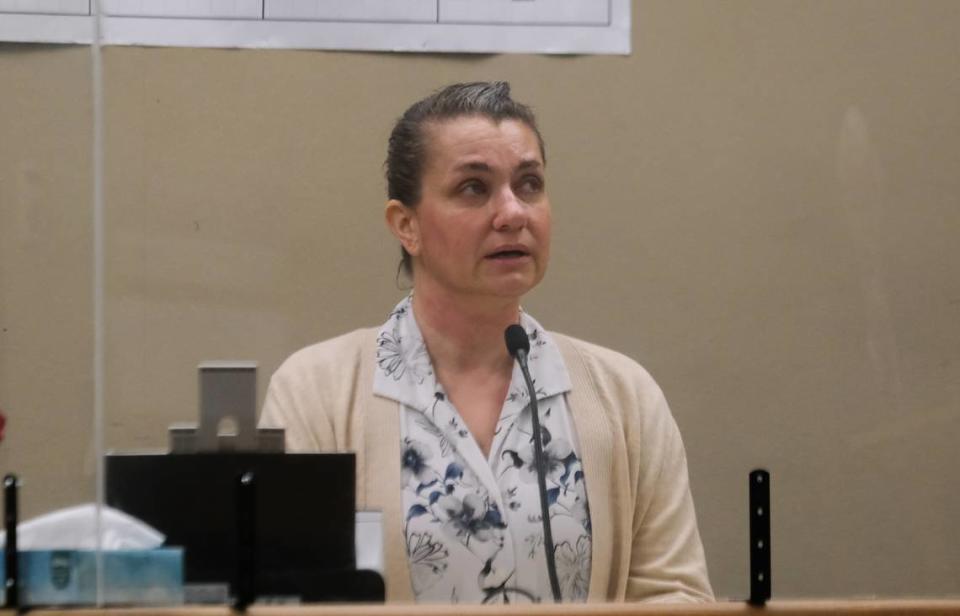
Defendant admits to lying to law enforcement
Turner testified she lied in her interview with law enforcement on May 23 because she was high, didn’t want to get in trouble for selling drugs and didn’t believe she was actually a drug dealer.
Turner confirmed she told officers during the May interview that she meant to meet Hall in a park but he didn’t show up, but when detectives told her they had her on video, she said she met up with Hall and told him to stay away from fentanyl.
Warning Hall about fentanyl addiction was true, she testified, but she did lie when she denied she sold Hall fentanyl.
She said that was the only lie she ever told law enforcement.
Turner said that she had texted Hall to stop taking fentanyl on Oct. 4, 2022, because she had heard he overdosed. She later found out that he had overdosed on GHB — not fentanyl — on Oct. 2, 2022.
San Luis Obispo County Sheriff Office’s Det. Luke Weimer, who interviewed Turner in May, said he was not aware that Turner’s husband had died of a fentanyl overdose and appeared disturbed when officers shower her photos of Hall’s body just before her arrest.
Weimer said Turner said she had a clear mind before their interview but was aware Turner was a daily meth user and that longtime meth use can affect thinking.
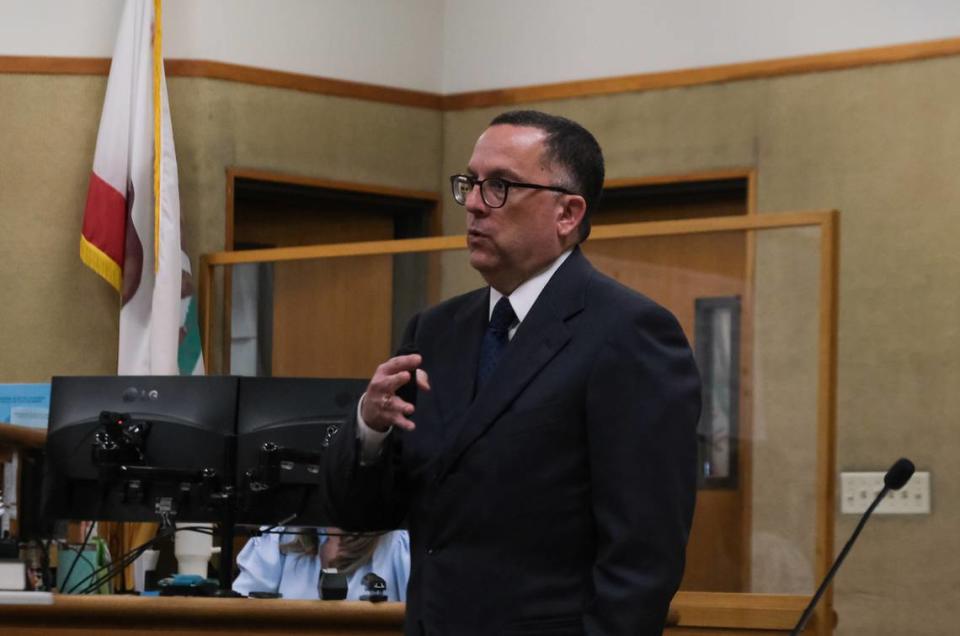
Prosecutor encourages jurors to find alleged drug dealer guilty of murder
On Thursday morning, Devitt began his closing arguments encouraging jurors to find Turner guilty of second-degree murder.
He said it was clear that Turner knew fentanyl could have killed Hall even if it wasn’t her intent. Her act of selling the drug is what caused Hall’s death, Devitt argued.
Devitt said he believes Turner lied on the stand when she said she didn’t think of herself as a drug dealer, referring to texts of her talking about money when setting up deals, including messages that read “this isn’t a bank, bring cash or don’t come,” and texts dismissing the quality of fentanyl from other dealers.
He added that her texts show her clearly knowing the dangers of fentanyl, and she personally knew the dangers after her husband’s death and her overdose.
Devitt also argued the training she completed more than a year before Hall’s death while she was working at California Men’s Colony clearly explained the dangers of fentanyl.
“If she didn’t sell to him, we wouldn’t be here,” Devitt said.
He said Turner knew Hall would use the fentanyl when she sold it to him and was profiting off his addiction.
Hall’s failure to use reasonable care when he ingested the drug may have contributed to his death, Devitt argued, but Turner’ act — in this case selling fentanyl — is the factor that caused Hall’s death, and she should be held accountable for it.
Defendant did not murder through a drug sale, attorney argues
During closing arguments, Turner’s attorney, Jeffry Radding, asked jurors to consider how much weight “expert” testimony carries over real life experiences.
Two of the expert witnesses the prosecution called gave statements about the deadliness of fentanyl, and said its potency was 100 times stronger than morphine and 50 times stronger than heroin.
But that doesn’t mean it is 100 times deadlier than morphine or 50 times deadlier than heroin, Radding said.
Radding noted that Evan Matshes, a forensic pathologist with San Luis Obispo County’s coroner’s office, testified there was no data for fentanyl-caused deaths among a population of users — only that fentanyl deaths have increased over time.
Fentanyl has also increased its presence in the United States, Radding said, so the increase of deaths could simply just reflect the drug’s increased market share on the streets.
Radding noted how Matshes and other expert witnesses testified about the PPE and precautions they take when handling fentanyl, then showed a photo of detectives searching the RV they knew would likely have fentanyl inside without masks.
Turner and her roommate also lived in the RV exposed to the fentanyl without issue, Radding added.
“That’s real life,” Radding said.
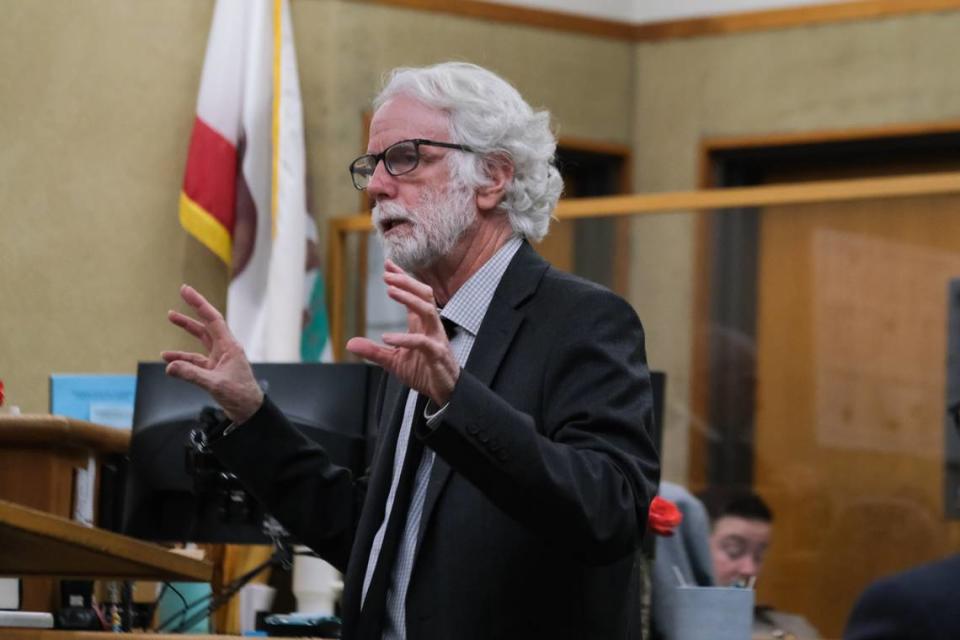
Radding accused the prosecution of trying to make Turner look like an experienced drug dealer when it had a detective testify about estimating measurements of drugs because officers did not seize a scale during their Nov. 9, 2022, search warrant. But Turner testified there was a scale underneath the Bible which had fentanyl inside its pages and detectives missed it, he said.
The attorney said his client was a low-level street dealer of meth and a simple “middle-man” when it came to fentanyl. Her roommate, who also had possessions inside the RV that was searched, was the one who dealt the drug, Radding said.
He reminded the jury in the text exchange on the day of Hall’s death, Turner messaged Hall, “he is getting it ready.”
Meanwhile, all Turner had going into the drug deal was her real life experiences, Radding said.
Turner’s experience of the drug was that it only killed when someone unknowingly ingested it, Radding said. She knew Hall was a regular fentanyl user and warned him not of death on the day she sold him the drug, but of what fentanyl addiction can do to a person, the attorney said.
He noted that Turner texted Hall on Oct. 4, 2022, warning him of fentanyl after she heard Hall had overdosed. She assumed Hall overdosed on fentanyl, but that time, he overdosed on GHB.
Radding said on the evening of Hall’s death, he suspected the man took two hits of fentanyl, because a bloody nose towel was found propped up on the fence near the body. Radding said he thought Hall took a hit, got a bloody nose, then overdosed on his second hit and fell to the ground, still holding the smoking device.
If jurors decided Turner selling Hall fentanyl caused his death, Radding asked them to convict her of involuntary manslaughter. If they found the sale did not cause Hall’s death, Radding said, she should only be convicted of the drug charges.
Devitt is expected to give his rebuttal at 1:30 p.m. Friday, then the jury will head straight into deliberations.

